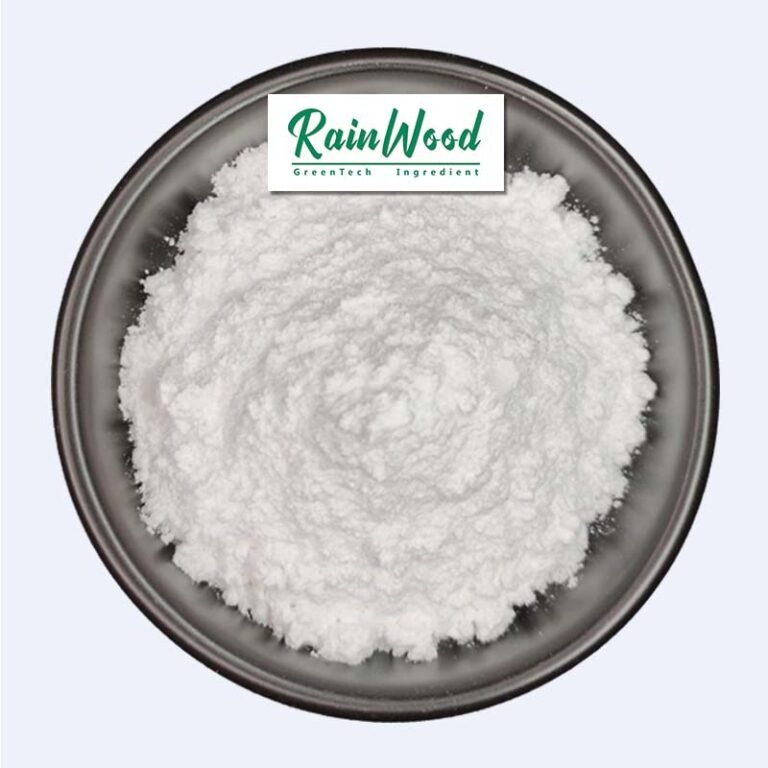
Thymoquinone
Thymoquinone is a phytochemical that occurs naturally in black seed, as well as in the Monarda fistulosa plant, which is cultivated in the United States and can be distilled to obtain the essential oil.
Simply fill out the form below and one of our customer service representatives will contact you shortly.
Address: Rm 218, Tangxing Digital Bld, #6 Tangxing Rd, Xi’an, Shaanxi, China
Phone: +86 17791258855
Landline: +86 (0)29 81870046
Email: info@rainwoodbio.com

Thymoquinone is a phytochemical that occurs naturally in black seed, as well as in the Monarda fistulosa plant, which is cultivated in the United States and can be distilled to obtain the essential oil.

Triindolyl carbinol, also known as indole-3-carbinol (I3C), is a naturally occurring compound found in cruciferous vegetables such as broccoli, cabbage, and Brussels sprouts. It is a derivative of indole and has gained significant attention for its potential health benefits.

The chemical name of tauroursodeoxycholic acid (TUDCA) is 3α, 7β dihydroxycholanyl-N-taurine, which is a condensation between the carboxyl group of ursodeoxycholic acid (UDCA) and the amino group of taurine. Conjugated bile acids.

Urolithin is a metabolite that is produced by the gut microbiota when they break down ellagitannins, which are found in certain foods such as pomegranates, strawberries, and nuts. Urolithin is available in several forms, including urolithin A, urolithin B, urolithin C, and urolithin D.Research suggests that urolithin has several potential health benefits, including: anti-inflammatory effects, antioxidant activity and more.

Milk contains two kinds of protein predominantly – casein and whey. A mixture of proteins become isolated from whey during cheese production from milk. This protein mixture is known as whey protein.
The difference in the forms of whey protein basically stems from their manner of processing. They also determine their nutrition facts.
1. Hydrolysate Whey Protein
Hydrolysate or hydrolyzed whey is whey that has been pre-digested. It gets absorbed faster than the other forms. Hydrolyzed whey is responsible for a 28-43% more spike in insulin level than whey in the isolate form.
2. Isolate Whey Protein
Isolate whey protein contains 90% protein and sometimes, even higher. It contains less fat and lactose as well as lesser beneficial nutrients than is found in whey protein concentrate.
3. Concentrate Whey Protein
Whey protein in concentrate form contains around 70-80% protein. It also contains lactose and fat. Overall, it is the most delicious of all the whey protein variants.
If you do intend to start consuming whey protein, choose a concentrate as, not only is it cheaper – it also retains the most amount of naturally occurring nutrients in whey.
However, if you are strict about the carbs and fats you consume, the isolate or hydrolysate form may be a better option for you.

In the 1940s, Dr. Pillemer first discovered and reported that there was a substance in the yeast cell wall that had immune-boosting effects. Later, after further research by Dr. Diluzio of the University of Tulum, it was found that the immune-boosting substance in the yeast cell wall is a polysaccharide – beta-glucan, and this substance was isolated from bread yeast.

Thymoquinone is a phytochemical that occurs naturally in black seed, as well as in the Monarda fistulosa plant, which is cultivated in the United States and can be distilled to obtain the essential oil.

Triindolyl carbinol, also known as indole-3-carbinol (I3C), is a naturally occurring compound found in cruciferous vegetables such as broccoli, cabbage, and Brussels sprouts. It is a derivative of indole and has gained significant attention for its potential health benefits.

The chemical name of tauroursodeoxycholic acid (TUDCA) is 3α, 7β dihydroxycholanyl-N-taurine, which is a condensation between the carboxyl group of ursodeoxycholic acid (UDCA) and the amino group of taurine. Conjugated bile acids.

Urolithin is a metabolite that is produced by the gut microbiota when they break down ellagitannins, which are found in certain foods such as pomegranates, strawberries, and nuts. Urolithin is available in several forms, including urolithin A, urolithin B, urolithin C, and urolithin D.Research suggests that urolithin has several potential health benefits, including: anti-inflammatory effects, antioxidant activity and more.

Milk contains two kinds of protein predominantly – casein and whey. A mixture of proteins become isolated from whey during cheese production from milk. This protein mixture is known as whey protein.
The difference in the forms of whey protein basically stems from their manner of processing. They also determine their nutrition facts.
1. Hydrolysate Whey Protein
Hydrolysate or hydrolyzed whey is whey that has been pre-digested. It gets absorbed faster than the other forms. Hydrolyzed whey is responsible for a 28-43% more spike in insulin level than whey in the isolate form.
2. Isolate Whey Protein
Isolate whey protein contains 90% protein and sometimes, even higher. It contains less fat and lactose as well as lesser beneficial nutrients than is found in whey protein concentrate.
3. Concentrate Whey Protein
Whey protein in concentrate form contains around 70-80% protein. It also contains lactose and fat. Overall, it is the most delicious of all the whey protein variants.
If you do intend to start consuming whey protein, choose a concentrate as, not only is it cheaper – it also retains the most amount of naturally occurring nutrients in whey.
However, if you are strict about the carbs and fats you consume, the isolate or hydrolysate form may be a better option for you.

In the 1940s, Dr. Pillemer first discovered and reported that there was a substance in the yeast cell wall that had immune-boosting effects. Later, after further research by Dr. Diluzio of the University of Tulum, it was found that the immune-boosting substance in the yeast cell wall is a polysaccharide – beta-glucan, and this substance was isolated from bread yeast.
Need help or have a question?
Address: Rm 218, Tangxing Digital Bld, #6 Tangxing Rd, Xi’an, Shaanxi, China
Phone: +86 17791258855
Landline: +86 (0)29 81870046
Email: info@rainwoodbio.com